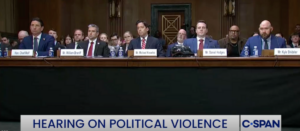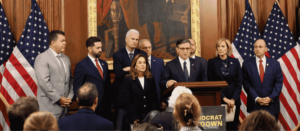Protecting Our Financial Future from ESG
“No one wants to work for decades only to scrape by.”
Kate Spitz is Associate Counsel at the Wisconsin Institute for Law and Liberty (WILL), a nonprofit public interest law firm. At WILL, Kate defends Americans from executive overreach and seeks to protect their First Amendment freedoms and parental rights in education.
Kate is counsel for a legal challenge to protect her clients from a Biden Administration action that unlawfully takes advantage of federal retirement funds. This action encourages the use of “Environmental, Social, and Governance” (ESG) scores in managing retirement funds.
Concerned Women for America Legislative Action Committee attended the enrollment ceremony for a bill that would have protected retirement funds from this mismanagement. ESG is being used as a means to an end for many causes, including abortion. One of our goals is to make sure there is no government thumb on the scale for policies that undermine Biblical values.
We met Kate and one of her clients, Fred Luehrs, at the ceremony. Afterwards, she joined us for an interview about how her clients are fighting back against mismanagement of taxpayer dollars and defending a financially secure future.
CWA: Thanks for sitting down with us, Kate. We met at the enrollment ceremony for H.Res.30, a bill to protect 401(k) retirement holders from a rule by the U.S. Department of Labor that encourages mismanaged priorities for retirement funds. What more can you tell us about the rule and the bill?
Kate: “WILL filed a legal challenge against the rule from the Labor Department. Parts of the rule put a thumb on the scale for certain types of environmental and social policies when deciding how to invest retirement funds. The problem is the Labor Department does not have authority to regulate environmental policy—or any policy—via retirement fund investments.
The rule is a backdoor effort to push climate change policies and other progressive wish list items like “Diversity, Equity, and Inclusion.” This takes place almost entirely outside of the congressional process, without accountability, and using retirees’ money.
The bill, H.J.Res.30, simply says that the Labor Department rule should be repealed. A few Democrats in the House and Senate even crossed the aisle. A number abstained. This showed that Americans do not want politics injected into their retirements. There are plenty of places to have that debate but retirement is not one of them.
Unfortunately, President Biden vetoed the bill and accused “MAGA Republicans” and “Marjorie Taylor Green” (R-Georgia) of politicizing retirement. But only the Administration is politicizing retirement for its political ends.”
CWA: Can you tell us more about your clients?
Kate: “My clients, Fred Luehrs and Rick Braun, are Wisconsin employees who have 401(k) plans. Fred was invited by Speaker of the U.S. House of Representatives Kevin McCarthy to see H.J.Res.30 enrolled before it went to the President’s desk in March.
Fred and Rick are from Waukesha County, Wisconsin. Fred does maintenance and oversight at a chemical company, and Rick is a logistics manager and former service member who served in Iraq. They are from Wisconsin but stand in the shoes of over 140 million workers nationwide who have a 401(k), the program for federal retirement funds.
You do not have to be an accountant or financial manager to have an interest. If you are a 401(k) holder, or if your spouse is a 401(k) holder, you are affected. And as women, we are especially sensitive to retirement-fund security because we often outlive our spouses, and we want to make sure everyone is provided for.”
CWA: What is the concern about how retirement will be used?
Kate: “The Labor Department rule lets fiduciaries put political pet causes ahead of the interests of retirees. As a result, the concern is about a loss in value of retirement—of Fred and Rick’s retirement funds. They have families to support. No one wants to work for decades only to scrape by.
ESG brings politics in where it doesn’t belong. It would be devastating for Fred, Rick, or any other American to have less money than they should have when they retire just because the administration wants to play politics and virtue signal with their money.
Federal law says that fiduciaries must maximize returns for workers with 401(k) accounts. The practice has been to prioritize whether a company is a good investment in the short, middle, and long term—not the company’s politics. That does not mean ignoring benefits to society. The law is ok with considerations like benefits to society—as long as the financial return is about equivalent.
If you have two businesses that are equal and one has an affordable housing program, it is fine to pick the one because it has an affordable housing program. But if the business with the affordable housing program was less fiscally sound, it would not be appropriate to pick it.
Moreover, it is difficult to financially quantify a new policy like, “our nine-member board will always have at least four women sitting on it.” It might be a great idea. But there is no reliable way to quantify risk or return for a policy like that.
Introducing politics as a risk return factor is brand new and does not seem to be supported by numbers to date. Some ESG funds have been documented to underperform against the market by as much as 44%. For the administration to encourage ESG is dubious at best and politically opportunistic at worst.”
Unfortunately, there are companies that oversee retirement money that take advantage of their position of trust. These companies use their power to advance goals and ideologies without the full knowledge or approval of individuals for whom they serve.
We are grateful to Kate and her clients for taking the right stand on this issue!






